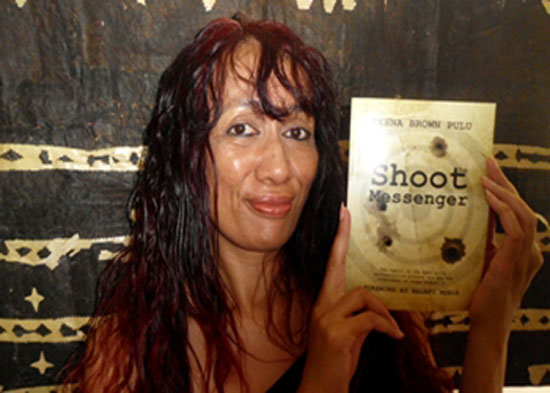
REVIEW: Shoot the Messenger: The report on the Nuku'alofa reconstruction project and why the government of Tonga dumped it, by Teena Brown Pulu, 171 pp, mono, paperback. Published in February 2012 by Taimi Publishers, Nuku’alofa, Tonga. ISBN 978-0473205591.
Anthony Haas
An Auckland-based Tongan academic’s reporting and analysis of contemporary Tongan provides an agenda for media, opposition and others who should operate the kingdom’s democratic process.
The unpleasant reality is that quality media which produce a high level of economic and political analysis is largely absent says the author of Shoot the messenger in her book about Tonga. This absence from state affairs signals that “an old guard attitude refuses to go away”.
Dr Teena Brown Pulu says the media’s ability to deliver investigative journalism is fundamental to strengthening civic society and participatory democracy.
Critical media should, in theory, act responsibly as society’s conscience, a role designed to hold government and politicians accountable to law, public policy, development plans, budgets and outcomes advantageous to communities.
Dr Pulu, a Tongan New Zealander, niece of Tongan Prime Minister Lord Tu’ivakano and lecturer at Auckland University of Technology, passionately publicised her analysis of Tonga’s political system and national agenda in a hard hitting account of problems she faced in Tonga.
Kalafi Moala, publisher of Shoot the Messenger, says “because” a report she wrote for the Tongan government “did not confirm the allegations of funds having been mishandled or misused, the report was rejected and Teena and her colleague were summarily dismissed from the inquiry”.
“Author Teena Brown Pulu is enthusiastic about her country of origin but is not blind to the realities of the struggles being experienced by the Pacific’s youngest democracy, especially when old political habits and tactics emerge in what is supposed to be an entirely new era of politics” says Moala.
She compares media to MPs “on the opposition bench who question the rationale behind government decisions and the transparency of decision-making processes”.
She has written as a participant observer about what happened in her research for the report on the Nuku’alofa reconstruction project and why the Government of Tonga dumped her report. She has raised issues around the incident involving her, and issues it touches on.
Her account provides an agenda of coming Tongan realities for media, the opposition and others with roles in providing good governance, accountability and transparency.
• What are short and long term developments needed in Tonga’s democratic arrangements?
• What happens when friends and relatives fall out in a small society?
• What will the Parliamentary Opposition do with the issues cited?
• How will the media follow up?
• What will donors and lenders do on issues ranging from Chinese loans to Tonga’s energy road map?
• What are the roles for palangi in Tongan development?
• What checks, balances and systems should be introduced into the Prime Minister’s role and office?
• How should ministerial “advisers” behave?
• What attitudes and systems can improve information flows from government to Parliament, media and citizens?
• What public sector training and systems can help policy formation and evaluation?
• Who should do what about nobles’ exercise of power?
• How might Tonga handle the results of its Royal Commission on land?
• What can be done by whom to foster participatory democracy in Tonga?
• How urgent are Tonga’s fiscal challenges?
• What growth role could Tonga’s government plan to provide?
The political landscape in Tonga reveals systemic glitches in progressing democratic reform. “Immense power and authority are invested in the Premier’s role without methodical checks and balances” she says.
“A clear majority of the legislative assembly have not been raised in, nor have lengthy lived experience of a democratic state and society….," the academic says.
There is another question: How should people in Tonga and its diaspora handle the passion of migrants such as Dr Pulu?
Anthony Haas is Asia Pacific Economic News representative in the NZ Parliament’s Press Gallery, publisher DecisionMaker Publications/ Destinations Tonga; and director of the Centre for Citizenship Education. This review was first published here.
This work is licensed under a Creative Commons Attribution-NonCommercial 3.0 New Zealand Licence.




